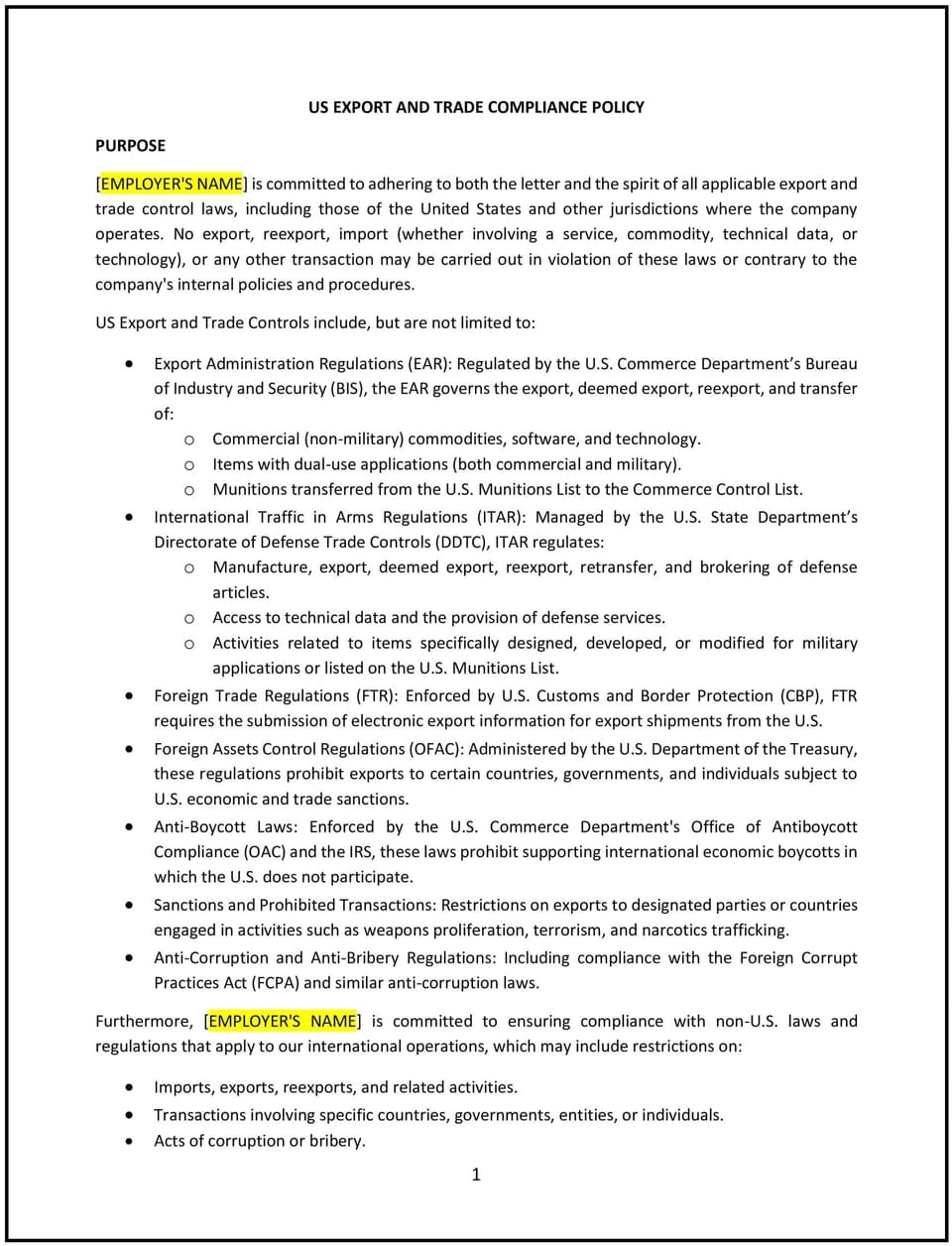US export and trade compliance policy (Virginia): Free template

This US export and trade compliance policy is designed to help Virginia businesses comply with federal and state laws governing the export of goods, services, and technologies. The policy outlines key procedures and responsibilities for ensuring that all exports align with applicable regulations, including export controls, trade sanctions, and documentation requirements.
By adopting this policy, businesses can promote compliance with legal requirements, mitigate risks associated with export violations, and streamline their export processes to support growth in international markets.
How to use this US export and trade compliance policy (Virginia)
- Identify applicable regulations: The policy should outline the specific federal and Virginia state export regulations that apply to the business, including the Export Administration Regulations (EAR), International Traffic in Arms Regulations (ITAR), and trade sanctions enforced by the Office of Foreign Assets Control (OFAC).
- Define key responsibilities: Assign accountability for compliance to specific roles within the business, such as an export compliance officer, to oversee adherence to export laws and implement necessary procedures.
- Establish screening procedures: Include a process for screening customers, suppliers, and end-users against restricted party lists and identifying prohibited countries or entities.
- Outline export license requirements: Specify when an export license is required, how to apply for one, and the process for ensuring proper license use for controlled goods, services, or technologies.
- Document export transactions: Create a process for maintaining accurate records of all export activities, including invoices, shipping documents, licenses, and correspondence, in compliance with federal and state retention requirements.
- Train employees: Ensure employees involved in export activities are trained on their compliance responsibilities and understand the implications of non-compliance.
- Implement an internal audit process: Set up periodic reviews to identify gaps in the compliance process and ensure continuous improvement.
- Include reporting mechanisms: Provide clear guidance on how employees can report potential violations or concerns anonymously and without retaliation.
- Periodically review the policy: Regularly update the policy to reflect changes in federal or state export regulations, ensuring it remains relevant and effective.
Benefits of using this US export and trade compliance policy (Virginia)
This policy offers several benefits for Virginia businesses:
- Reduces legal risks: By aligning export activities with applicable regulations, businesses can avoid penalties, fines, and reputational damage associated with export violations.
- Enhances operational efficiency: A well-structured policy streamlines the export process by providing clear procedures for compliance, reducing delays caused by regulatory issues.
- Promotes international trade opportunities: Compliance with export regulations allows businesses to expand confidently into global markets, fostering growth and competitive advantage.
- Improves employee accountability: Clearly defined roles and training ensure employees understand their responsibilities in adhering to export controls, minimizing the risk of unintentional violations.
- Supports risk management: Regular audits and reporting mechanisms help identify and address compliance risks before they escalate into larger issues.
Tips for using this US export and trade compliance policy (Virginia)
- Tailor the policy to your industry: Customize the policy to address export regulations that are most relevant to your business, such as those affecting controlled technologies, defense-related products, or dual-use items.
- Keep employees informed: Regularly train employees on changes to export regulations and reinforce the importance of compliance in all business operations.
- Use technology for compliance tracking: Consider implementing export management software to streamline screening, documentation, and reporting processes.
- Monitor regulatory updates: Assign a team or individual to monitor changes to federal and Virginia state export laws and incorporate updates into the policy as needed.
- Conduct regular audits: Periodically review export transactions and compliance procedures to identify and resolve any issues before they become problematic.
Q: Who is responsible for export compliance in the business?
A: Assign specific roles, such as an export compliance officer, to oversee adherence to export laws and implement the necessary procedures for managing export activities.
Q: What regulations apply to exports in Virginia?
A: Businesses in Virginia must comply with federal export laws, including the Export Administration Regulations (EAR) and International Traffic in Arms Regulations (ITAR), as well as trade sanctions enforced by OFAC.
Q: What is the purpose of export screening?
A: Screening ensures that businesses do not engage in transactions with restricted entities, individuals, or countries, helping prevent violations of trade sanctions and export control laws.
Q: How can employees report potential violations?
A: The policy should provide clear mechanisms for employees to report concerns anonymously and without retaliation, such as through a hotline or online reporting tool.
Q: How often should this policy be reviewed?
A: The policy should be reviewed at least annually and updated as needed to reflect changes in federal and state export regulations or business operations.
This article contains general legal information and does not contain legal advice. Cobrief is not a law firm or a substitute for an attorney or law firm. The law is complex and changes often. For legal advice, please ask a lawyer.


